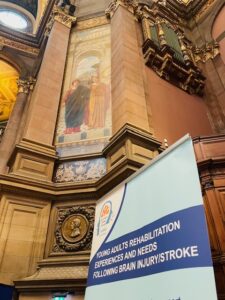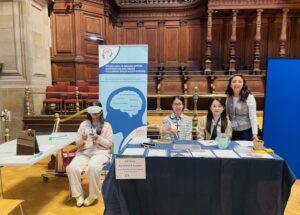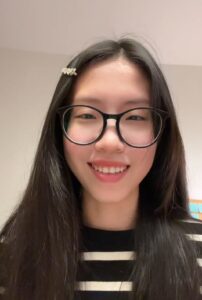Understanding Acquired Brain Injury and Stroke through Science and Experience – University of Edinburgh Doors Open Day 2025
In this post, Gaoyuan Zhang, Postgraduate MSc Advanced Nursing student who is taking the Acquired Brain injury and Stroke Rehabilitation course at the University of Edinburgh, shares her experience participating in the University of Edinburgh Doors Open Day 2025 as a student volunteer. She took part in an interactive event with the YARNS Transitions Project team, designed to raise awareness of stroke rehabilitation and help people better understand the challenges faced by young adults after brain injury or stroke.
___________________________________________________________________________________________________________________________________________________________

Raising Awareness through Interactive Learning
In September 2025, I volunteered at the Open Day at the University of Edinburgh. Our topic was “Young Adults’ Rehabilitation Experiences and Needs following Brain Injury/Stroke.” During the event, I introduced basic knowledge about stroke and how it affects the brain and body to the public.
At our booth, we hosted some fun and interactive activities. One of the most popular was the VR experience, where visitors could see the names and functions of human bones and understand how the brain controls movement. We also showed a brain model, which helped people see how different parts of the brain work and what happens when a brain injury/ stroke damages them.
Another activity was the mirror maze game. It looks simple, but when people tried it, they found it quite hard to control their movements. This helped them feel what stroke patients might experience when their brain and body don’t coordinate well. Many said it made them realise how much support and patience stroke survivors need from others.
One moment that really touched me was when a stroke patient’s wife came to our stand. She said she didn’t know much about the project before, but after talking with us, she became very interested. She asked how we could support patients like her husband, and whether we had any financial support or programmes available. She told us our work was very meaningful and took lots of photos of our materials. Before leaving, she wrote down the email address of our organiser, Dr Lissette Aviles, so she could contact us later.

Many other visitors also showed great interest. Some didn’t have any relatives with stroke but said the activities were eye-opening and meaningful. After trying the mirror maze game, a few people said they would try to be more understanding and patient with people recovering from brain injury.
This event was a special experience for me. I felt proud to take part in a project that helps people understand more about stroke and rehabilitation. It reminded me how important it is to raise public awareness—not only about medical care but also about empathy and social support. I hope more people can learn about what we do and continue to support stroke survivors in the future.
Our blogger

I’m Gaoyuan Zhang, a student of Acquired Brain Injury and Stroke Rehabilitation course, as part of the MSc Advance Nursing programme. I’m passionate about health education related to stroke and hope to continue promoting awareness and support for people recovering from brain injury and stroke.




Recent comments